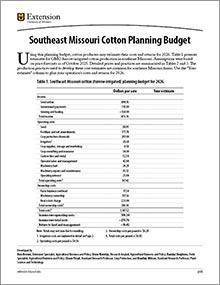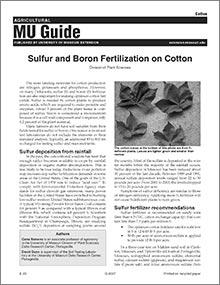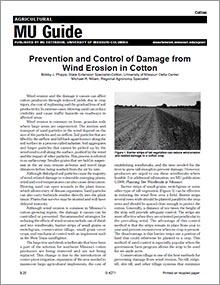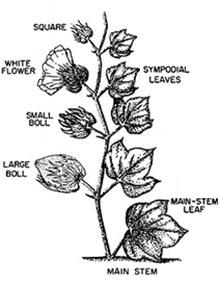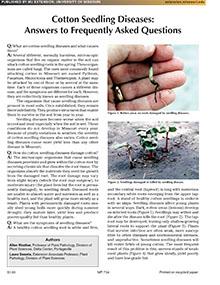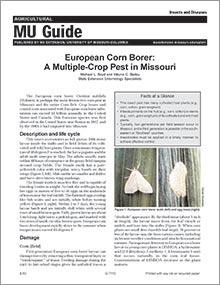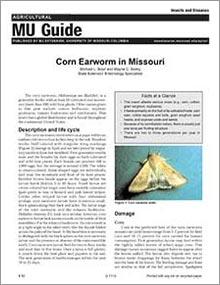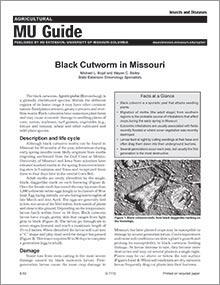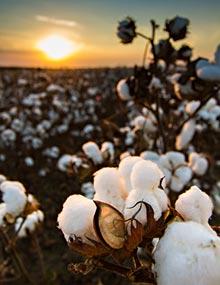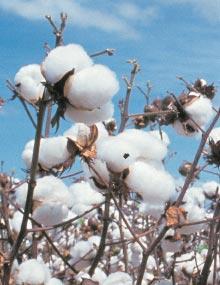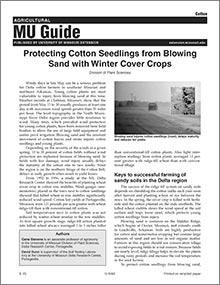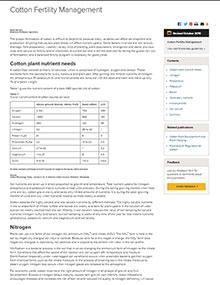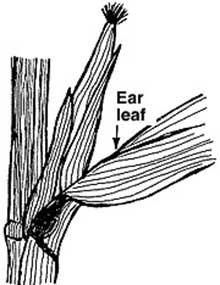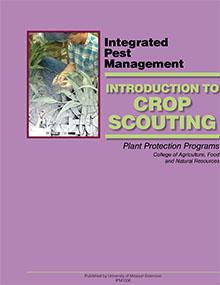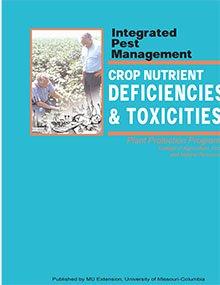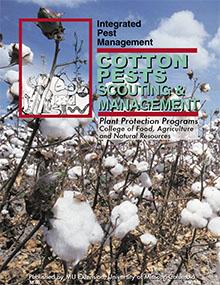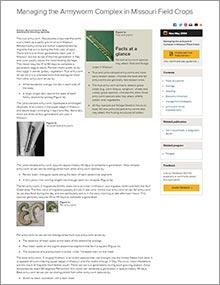The following publications cover topics related to Cotton Extension. For a complete list of MU Extension publications, visit the main Publications page.
Southeast Missouri Cotton Planning Budget
Revised
Use this crop enterprise budget as a guide to estimate your production costs and returns when growing cotton on southeast Missouri farms.
Sulfur and Boron Fertilization on Cotton
Reviewed
Learn how sulfur and boron fertilization improve cotton yields, including soil test recommendations and deficiency symptoms to optimize cotton production.
Prevention and Control of Damage From Wind Erosion in Cotton
Reviewed
Strategies for preventing and controlling wind erosion in cotton include windbreaks, cover crops, conservation tillage, and mechanical methods.
Cotton Plant Development and Plant Mapping
Reviewed
Learn about cotton plant growth, development, and mapping techniques to optimize management and yield in Missouri’s short-season environment.
Cotton Seedling Diseases: Answers to Frequently Asked Questions
Reviewed
What are cotton seedling diseases and what causes them?
European Corn Borer: A Multiple-Crop Pest in Missouri
Revised
Learn how the European corn borer affects crops like corn, cotton, and grain sorghum in Missouri. Explore its lifecycle, damage, and management strategies.
Corn Earworm in Missouri
Revised
Learn about corn earworm's impact on Missouri crops, its life cycle, and management strategies to protect yields from this pervasive pest.
Black Cutworm in Missouri
Reviewed
Black cutworm larvae damage seedlings by cutting stems at night, causing stand loss in crops like corn, soybeans, and cotton.
Getting Started With Soil Health Testing in Missouri
New
Learn how to assess soil health in Missouri with proper sampling methods and testing protocols.
Plant Growth Regulators for Cotton
Reviewed
Plant growth regulators help manage cotton growth to improve yield, quality, and boll retention. Learn how to apply them effectively for optimal results.
Cotton Harvest Aids
Revised
Learn effective cotton defoliation techniques, the best harvest aids, and timing for optimal fiber quality and yield in Missouri’s growing conditions.
Protecting Cotton Seedlings From Blowing Sand With Winter Cover Crops
Reviewed
Depending on the severity of the winds in a given spring, 10 to 30 percent of cotton fields without wind protection are replanted because of blowing sand. In fields with less damage, wind injury usually delays the maturity of the cotton one to two weeks.
Cotton Fertility Management
Revised
Optimize cotton yields with balanced fertilization, timely nutrient applications, and soil testing to ensure healthy growth and efficient nutrient uptake.

The Boll Weevil in Missouri: History, Biology and Management
Revised
Details the boll weevil's impact on Missouri cotton, its life cycle, and eradication efforts that concluded in 2008.
Sampling Plant Tissue and Soil for Analysis
Revised
This publication provides guidance on proper techniques for sampling plant tissue and soil to ensure accurate nutrient analysis.
Introduction to Crop Scouting
Reviewed
Editor's note
The following abstract describes a publication that is available only as a downloadable PDF.
Crop Nutrient Deficiencies and Toxicities
Reviewed
Editor's note
The following abstract describes a publication that is only available as a downloadable PDF.

Cotton Disease and Nematode Management
Revised
Guide to identify and manage cotton diseases and nematodes with effective cultural, chemical and resistant variety strategies.
Cotton Pests: Scouting and Management
New
Learn effective scouting and management techniques for cotton pests in Missouri, focusing on plant development and integrated pest management strategies.
Managing the Armyworm Complex in Missouri Field Crops
New
Learn to identify and manage true, yellowstriped, beet, and fall armyworms in Missouri field crops, including corn, wheat, and pastures
